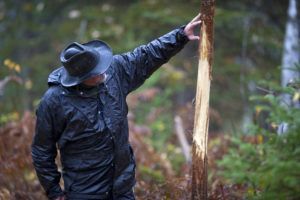Regulation of Commercial Guiding Industry Long Overdue in Michigan
Please click here to view MUCC’s one-pager on commercial guiding.
Sometimes you look at something and it seems so obvious. How did nobody think of this before? Peanut butter and jelly, dipping grilled cheese in chicken noodle soup, creating a common sense, enforceable set of requirements for commercial guides to protect the safety of both Michigan’s hunters and anglers as well as her natural resources. While we may not know who first slapped some delicious strawberry jam on bread and paired it with peanut butter, it was Michigan United Conservation Clubs (MUCC) members who first saw the need for changes to commercial guiding regulation nearly 25 years ago. Members thought all those years ago that it’s only fair to require those who profit off of our natural resources to have some accountability while also ensuring that they are not putting their clients or themselves at risk.
Background
Michigan has had historically weak regulation of the growing commercial guiding industry. While the Michigan Legislature, Department of Natural Resources (DNR), and United States Coast Guard (USCG) have provided a minimal framework for fishing guides on the Great Lakes and connecting waters, there have been no rigid enforceable regulations on guides operating on inland waters or hunting and trapping. For a quarter century, MUCC and its members have prioritized commercial guiding regulations, first recognizing a need for change and passing a resolution outlining the framework in 1997.
Chief among the goals of the MUCC resolution was that Michigan create structured commercial guiding regulations to protect the safety of the guide and the client, requiring basic first aid and CPR certifications. Another goal was to ensure that guides provide invaluable harvest data to those managing our wildlife populations, including reports on the level of effort and harvest records if successful. At the time of the resolution’s adoption, accountability was fundamental in seeking these changes. Thirdly, there was a need to create a mechanism to eliminate the ability for any bad actors or serial violators to pose as legitimate guides by way of licensing fees and clear, enforceable rules. Lastly, guides must have sound knowledge of the game species being sought, as well as the current DNR regulations, responsible hunting and fishing practices.

A successful bear hunter poses with his harvest, family and hunting party after successfully hiring a professional bear guide. Photo credit: Nadeene DeLong of DeLong Bred Hounds
At the time, MUCC and its members thought these were all common sense things to ask of someone profiting off of Michigan’s natural resources.
More recently and in the current legislative sessio n, the legislators removed a requirement for guides to carry certain levels of liability insurance coverage and reduced the licensing fees to more modest levels. While MUCC would have preferred liability insurance remain in, it was a negotiating point the organization was able to leverage.
MUCC is among a l arge number of groups who testified in support of the legislation in October, and at that time, no organization or individual announced public opposition to the package.
How does it compare to other states?
Compared to our Great Lakes neighbors, Michigan’s current commercial guiding framework is relatively lax. In 2019, Indiana saw fit to make similar changes to what Michigan is proposing currently. Previously, only fishing guides were required to be licensed. Their fees are double the proposed rate in Michigan: $100 annually versus $150 for a three-year license in Michigan. Minnesota, Ohio and Wisconsin require little more than a fee on top of the United States Coast Guard requirements for guides fishing the Great Lakes and connecting waters. Unlike Ohio and Wisconsin, however, Minnesota has hunting guide regulations for bears, with requirements similar to the proposed changes in Michigan. The proposed legislation here in Michigan would take the best parts of all of these systems and give Michigan a fair, safe and enforceable structure.
Current Legislation
The bill’s first priority is to require a minimum set of safety standards. Simply put, a guide is responsible for their client’s safety, and these bills require that a guide has a stocked first aid kit and CPR training. Costs of CPR and first aid training can vary, but MUCC staff are all CPR and first aid certified. The cost to certify all MUCC staff through an in-person training was about $600.
Second, the legislation requires a three-year $150 licensing fee ($300 for non-residents), which is deposited directly into the state’s game and fish protection fund. Charter boats currently operating in Michigan would not have to pay this fee as they are already strictly regulated by the USCG.
Third, the bills dictate that an individual applying to be a guide has not been found guilty of certain game and fish violations or any felonies. Some examples of violations that would disqualify an individual are: hunter harassment, unlawful taking of game or fish, possession of an invasive species or illegal sturgeon, as well as a few others. Guides must also have a valid driver’s license or state identification card and possess the proper fishing or hunting license for the game they are pursuing.
Fourth, data reporting on species harvested and level of effort, including the number of hunters and counties hunted or bodies of water fished, will be vital to ensuring biologists have the most complete and accurate picture of the resource.
The fifth goal is the bill’s teeth. There are explicit, rigid penalties for violations of the law to weed out bad actors. Providing false information or guiding without a license will result in fines. Failure

Hiker examines Michigan elk rub. Photo Credit: Michigan Department of Natural Resources
to submit required harvest reports begins as a fine, but if it continues to happen, it can result in revocation of guide license. Under existing law, the DNR can seize a poaching guide’s boat, gear or individual hunting or fishing privileges, but little can be done to prevent the individual from turning right back around and becoming a “guide” again. We all, of course, hope that these instances are rare, but they do happen, and we need to give our law enforcement a way to put a stop to it.
Lastly, certain exemptions are carved out in the legislation, including individuals sharing expenses, landowners providing assistance on private land or non-profit volunteers or employees for hunter recruitment purposes.
When MUCC members hip adopted the resolution, it included language to create a licensing board, with examinations, peer reviews and the licensing authority to possess
disciplinary powers, including revocation or suspension of licenses. While these provisions are lacking in the current legislation, it is important to remember that the perfect is the enemy of the good. These reforms go a long way towards achieving MUCC membership goals. The third bill in the package gives the NRC the ability to regulate commercial hunting and fishing guides as a manner of take. It is not expected the use of this authority will be necessary at this time. Still, it does provide the NRC another tool to exercise its mandate to provide sound science-based decisions to our state’s wildlife and natural resource management.
The post Regulation of Commercial Guiding Industry Long Overdue in Michigan appeared first on Michigan United Conservation Clubs.
Recent Posts



